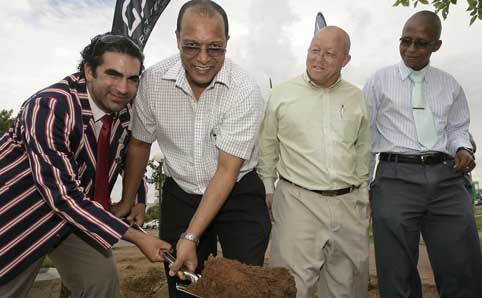Latest News Archive
Please select Category, Year, and then Month to display items
14 June 2024
|
Story Anthony Mthembu
|
Photo Suplied
 Jeremiah Hlahla, a UFS student completing his PhD in Botany at the University of Debrecen as part of an exchange initiative funded by the Erasmus+ Mobility Programme.
Jeremiah Hlahla, a UFS student completing his PhD in Botany at the University of Debrecen as part of an exchange initiative funded by the Erasmus+ Mobility Programme.
As part of an exchange initiative facilitated by the Erasmus+ Mobility Programme, Jeremiah Hlahla, a student at the University of the Free State (UFS), is nearing the completion of his PhD studies at the University of Debrecen in Hungary. Hlahla’s journey, which began in February 2024 and is set to conclude in July 2024, has been a remarkable learning opportunity. “As a first time-traveller to Europe, I have thoroughly enjoyed engaging with people from different countries and cultures,” he said.
The benefits of international collaboration
Hlahla is currently pursuing a PhD in Botany, focusing on plant stress physiology. “My current PhD project investigates the physiological, biochemical and morphological responses of vegetable-type soybean, or edamame, to combined drought and heat stress,’’ he explained. He considers the University of Debrecen the ideal institution to complete his research due to its extensive expertise and resources in similar projects. He noted that his colleagues at Debrecen conduct significant work on plant protection against biotic and abiotic stresses, including salt and drought stress, as well as proteins and amino acids in barley and other legumes.
Given the vast knowledge available on similar projects, Hlahla has found substantial engagement with his work at the University of Debrecen. “Upon arrival, I delivered an introductory lecture presenting my UFS project on the synergistic effects of combined drought and heat stress on the physiology and biochemistry of edamame. It was an engaging session as everyone could relate to my work and asked many questions,’’ he said.
Insights gained from the exchange
Hlahla has also gained valuable lessons that will assist him in his research career, including biotechnology and physiology tools. “I learned how to prepare samples and use high-performance liquid chromatography (HPLC) and reversed-phase ultra-high-performance liquid chromatography (UHPLC) to quantify proteins and amino acids,’’ he said. These techniques are beneficial not only for his current work but will also support future soybean research.
As his experience at the University of Debrecen nears its end, Hlahla reflects on the collaborations and friendships he has formed, which stand out as a significant highlight.
Construction work on new residences begins
2012-02-24
 |
|
From left are: Richard Chemaly, SRC President; Mr Quintin Koetaan; Prof. Nicky Morgan, Vice-Rector: Operations and Mr Pura Mgolombane, Assistant Dean: Student Affairs, at the sod turning ceremony.
Photo: Johan Roux
24 February 2012
|
Construction of two new residences on our Bloemfontein Campus will begin soon. Some 500 students will be accommodated in the residences, with the first students able to move in from January 2013.
The premises where the residences will be built were recently handed over to the contractors.
Mr Rudi Buys, Dean of Student Affairs, says that the design of the residences follow global trends in student accommodation, but are adapted to local needs and student communities. The new residences will provide more study and tutoring spaces, also with more open space for diverse students to socialise. The residences will function together as a Student Life College.
Mr Quintin Koetaan, Director: Housing and Residence Affairs, says the new residences will house both junior and senior students. Residences will co-ed, with men and women housed in separate and secure passages.
The planned construction of student accommodation includes five new residences – four on the Bloemfontein Campus that will provide 1000 beds and one on the Qwaqwa Campus with 250 beds. This will provide for the increasing need for student accommodation. The project will be completed in two phases. Phase one commenced in Bloemfontein on 21 February 2012.